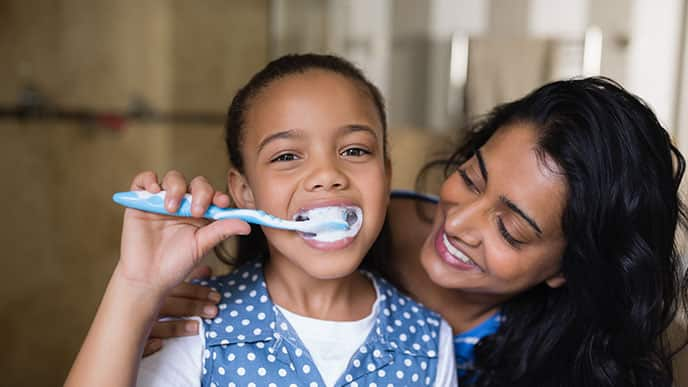Milestones of Baby’s First Tooth
When do babies start teething? Every baby is different, and each will have unique growth and development. Knowing when your baby’s first tooth will appear and which tooth will erupt can help you understand the various phases of tooth development. Milk teeth (primary teeth or deciduous teeth) begin forming while the child is still in the mother’s womb, and babies are born with a full set of 20 teeth hidden in their jawbone.
A baby’s first tooth typically erupts between 6 months and 1 year of age. The first teeth to appear are the central incisors, which are the two front teeth in the middle of the baby’s mouth. The upper and lower lateral incisors usually appear when the child is 9 or 16 months old. The canine teeth emerge between 16 and 23 months of age, the first molars between 13 and 19 months, and the second molars between 2 and 2.5 years of age.
How to Tame The Teething Soreness?
You may get the initial clue that your child is teething when you see changes in their behaviour, such as fussiness or sleeplessness. The baby first tooth symptoms often include excessive drooling, swollen, tender, or sore gums, gum rubbing, and an increased desire to chew on hard objects. To help ease the discomfort from the symptoms of teething, here are some remedies that you can try:
Giving the baby a cold rubber teething ring or toy to chew on can help manage irritability, as the cold has a numbing effect.
Gently rubbing the baby’s gums with a clean, cool, and wet washcloth can be soothing. You can also use a clean finger if the child’s erupting teeth are close to the surface.
Offering your baby soft and cold foods can help avoid irritating their gums while also soothing the pain and discomfort.
Giving your teething baby a bottle with cold water can also help alleviate soreness. However, avoid filling the bottle with milk or juice to reduce the risk of tooth decay.
With Teeth Come Table Foods
As your baby starts getting teeth, it is the perfect time to introduce them to their first foods. Until now, most babies have been nursing or drinking formula, perhaps with a bit of rice cereal mixed in. To help soothe the teething process, you can offer cold or chilled foods like unsweetened applesauce, yogurt, or baby food.
Once your baby is comfortable with the teeth, you can begin giving them solid foods in different textures. Start with easy-to-handle options like raw (but washed) pieces of fruits or veggies, such as celery or apples, that do not present a choking hazard. You may also offer them table foods like unsalted mashed potatoes, bananas, oatmeal, macaroni, and well-cooked vegetables (carrots, peas, and sweet potatoes). It is also a good time to look out for their first tooth eruption, which usually appears around six months of age.
Importance of The First Tooth
A baby’s first tooth is as important to infants as permanent teeth are to adults. The baby’s first tooth is more than just a charming addition to their smile; it plays a crucial role in their overall health and growth. Here are some of the factors that make them important:
Healthy baby teeth are essential for proper chewing and eating, which is crucial for your baby’s nutrition and overall health.
The first tooth can help with pronunciation, speech formation, and the development of clear speech as your child learns to talk.
Baby teeth hold space for the permanent teeth that later come in and ensure that the new teeth are growing in the correct positions.
Caring For Your Baby’s First Tooth
While the baby’s first tooth might seem trivial, it requires proper care and attention. If left untreated, they could develop issues like tooth decay. Here are some ways in which you can ensure care for your baby’s first tooth:
Start cleaning your infant’s gums even before your child’s first tooth erupts. Using gauze to clean the baby’s gums is ideal, especially after feedings and at bedtime.
Brush your baby’s teeth with a small, soft-bristled toothbrush and a pea-sized amount of toothpaste after feedings and at bedtime.
Care and caution must be exercised when selecting toothpaste for your baby. If you are looking for gentle toothpaste for your child, try using Colgate Kids Toothpaste for 0–2 years. Its 50% less abrasive formula helps clean your child’s teeth without harming the delicate tooth enamel. It contains zero artificial flavours, colours, sweeteners, or preservatives and comes in a natural fruit flavour.
Gently floss your baby’s teeth at least once a day, when they start erupting side by side, preferably before bedtime.
Do not use teething tablets and teething gels with benzocaine which functions as a numbing agents in relieving teething pain.
Schedule your child’s first dental visit when they are having their first birthday or when their first tooth erupts.
Understanding the baby teething age, the common signs of teething, the care needed for the baby’s first tooth, and the teething pain remedies are essential for ensuring good oral health for your child. This significant milestone comes with responsibilities, and being informed about the process can make it easier. By rightly recognising the teething symptoms and ensuring proper care to maintain good oral hygiene, you can help soothe your teething baby. With the right knowledge and understanding, you can support your baby’s teething journey and their dental health.
Frequently Asked Questions
1. When should babies get their first tooth?
A common question in most parents’ minds is when does the first tooth appear in a child. While the teething age can differ from child to child, the first tooth typically appears between 4 and 7 months old.
2. How long does it take for baby's first tooth to cut through?
The time it may take for the baby’s first tooth to cut through can vary for each child. But generally, the first tooth appears around 6 months and sometimes during their first year. The process of tooth cutting through the gum (known as teething) may take a few days to a couple of weeks.
3. What is the average age for a baby's first tooth eruption?
The average age for a baby's first tooth eruption is around 6 months. However, this can vary widely among infants. Some babies may get their first tooth as early as 3 months, while others may not see their first tooth until after their first birthday.
4. Is the first tooth the worst for teething?
Most often, the first tooth or teeth to emerge are considered to be the most painful for a child. This initial discomfort is due to the new and unfamiliar sensation that the child experiences. However, if the child is showing severe discomfort consulting a healthcare professional to get proper medical advice is recommended.
This article is intended to promote understanding of and knowledge about general oral health topics. It is not intended to be a substitute for professional advice, diagnosis or treatment. Always seek the advice of your dentist or other qualified healthcare provider with any questions you may have regarding a medical condition or treatment.
ORAL HEALTH QUIZ
What's behind your smile?
Take our Oral Health assessment to get the most from your oral care routine
ORAL HEALTH QUIZ
What's behind your smile?
Take our Oral Health assessment to get the most from your oral care routine








.jpg)




